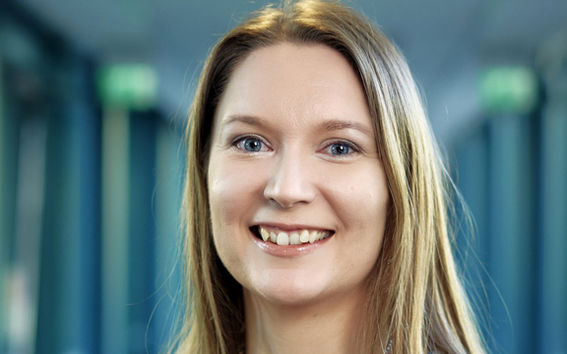Marja Matinmikko-Blue, Infotech Oulu-infrastructure
"Still only 15% of telecoms workers are women, so there is room! There are really good employment opportunities in this sector, because companies need new talent".

What have you studied and how did you choose this option?
I liked maths and physics and languages in high school, and decided to study Production Economics at the University of Oulu. I chose Production Economics because I didn't have to decide in the first year of my studies which field of engineering I would go into. As my studies progressed, I decided that I wanted to focus on telecommunications technology, as it is a really strong field in Oulu and there are a lot of ICT companies here.
How did you become a researcher?
During my studies, I worked at the Nokia factory during the summer and got to see how base stations were designed and manufactured. That's when I became interested in what goes on inside these devices. During my studies I did some teaching at university and towards the end of my studies I applied for a job at VTT, which works closely with the business world. I became interested in the collaboration between research and business. Through my work experience during my studies, I sort of drifted into becoming a researcher and realised how interesting it is to be involved in developing completely new things that don't yet exist.
What is the best thing about your job?
I think the best thing about my job is that I get to think about new, challenging things together with my colleagues. You don't have to just do things on your own, you get to innovate together. You learn a lot from working with good partners, because different people have so many different skills.
At its best, collaboration is really fruitful and moces everything forward. Developing new things together with others is what is important to me.
What have been the highlights and most important lessons of your career?
At the age of 25, I got involved in a pretty big role through the International Telecommunication Union (ITU) in assessing the spectrum needs for 4G systems. It was interesting to get to work with different countries and companies. As a young researcher, I was lucky to work with all those people who had much more experience than me. One of the highlights is the Young Scientist of the Year award I received from the Finnish Foundation for Technology Promotion in 2013. The most important thing I have learned in my career is how important it is to find good authors and collaborators around you. We all have different strengths and we all learn something from each other.
What are your expectations for the future?
In my current job, I can use all the experience I have gained so far. I haven't thought about a longer-term career at the moment, but working abroad with my Canadian husband could be an option in 10 years' time. My current job opens up a number of possible options, and at this stage I'm not choosing any in particular, but I'm not ruling any out either. My job has changed throughout the time I have been in the workforce. I am also actively seeking to change and develop my working methods. For example, a few years ago I drastically reduced the amount of travelling for work.
What greetings would you like to send to a young person considering a career choice?
When I was in high school, I didn't know how many opportunities there were in the ICT sector. But there are many jobs out there and we need people to do them. Still only 15% of telecoms workers are women, so there is room! There are really good employment opportunities in this sector, because companies need new talent.
For whom is this a suitable career option?
There is a wide variety of jobs in this sector. For the mathematically inclined, there is plenty to do. People who communicate and collaborate with others are also needed in the workplace. However, it is important to have a basic understanding of the industry and a basic knowledge of telecommunications. At work, it is important to be able to speak the same language and use the same terms with others. Analytical thinking is a quality that is useful in the industry.